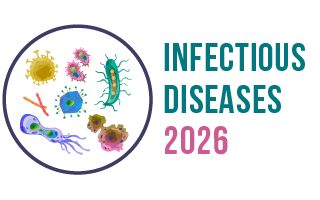4th International Conference on
Infectious Diseases
September 09-10, 2026 | Barcelona, Spain

Address: Avinguda Del Maresme 78 Ronda De Dalt Exit 15, 08940 Comella de Llobregat, Barcelona, Spain
Infectious Diseases 2026

Thomas Jefferson University, USA
Abstract:
Immune Thrombocytopenic Purpura (ITP) is an autoimmune condition characterized by IgG sensitization to circulating platelets, resulting in platelet destruction. While viral infections are established triggers, secondary ITP with tick-borne disease is rare. We present the first case report of ITP following infection with Anaplasmosis Phagocytophilum in an immunocompetent patient. A 61-year-old male presented with fever, chills, headache, and fever after travel to Maine. No petechiae, purpura, skin rashes, or bleeding were observed. Given the patient’s travel history, doxycycline, atovaquone, and azithromycin were initiated empirically. Laboratory evaluation revealed mild transaminitis, hyponatremia, and platelets of 8 K/uL, which declined to 3 K/uL within six hours following admission. Two units of platelets were administered, which increased counts to 4 and 7 K/uL. Given minimal response to transfusions, a diagnosis of ITP was suspected. Two doses of IVIG were pursued, increasing platelets to 17 K/uL. Serology confirmed Anaplasma Phagocytophilum, and the course of doxycycline was completed. Of note, hepatitis panel, viral respiratory PCR, and blood cultures were negative. Anaplasma Phagocytophilum is well-known in literature to ensue thrombocytopenia and elevated transaminases; however, no published reports have described the use of platelet transfusions and IVIG for ITP in the setting of tick-borne disease. This case demonstrates a need for further evaluation in febrile patients with travel history, particularly when viral serologies are negative. Tick-borne diseases should be included in the differential diagnosis for immunocompetent febrile patients in endemic areas. Monitoring with CBC is recommended for suspected cases for evaluation of possible underlying ITP.
Biography:
Julia Baran completed her B.A. in Biochemistry from Barnard College, Columbia University and is pursuing her M.D. at Sidney Kimmel Medical College, Thomas Jefferson University. At the Children’s Hospital of Philadelphia, she has authored more than 30 research contributions and received multiple awards for research and academic excellence.
